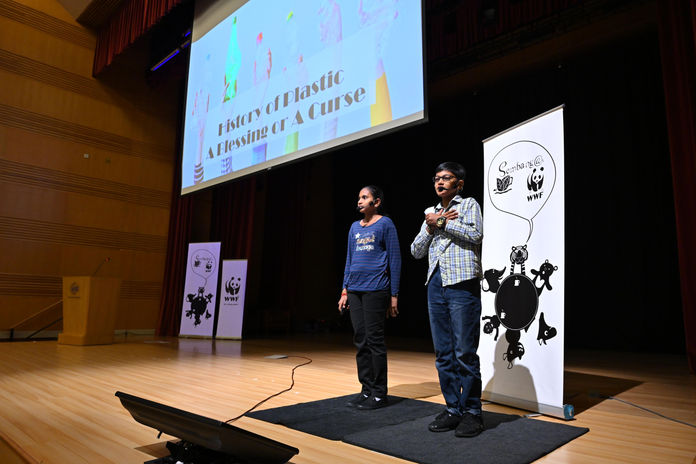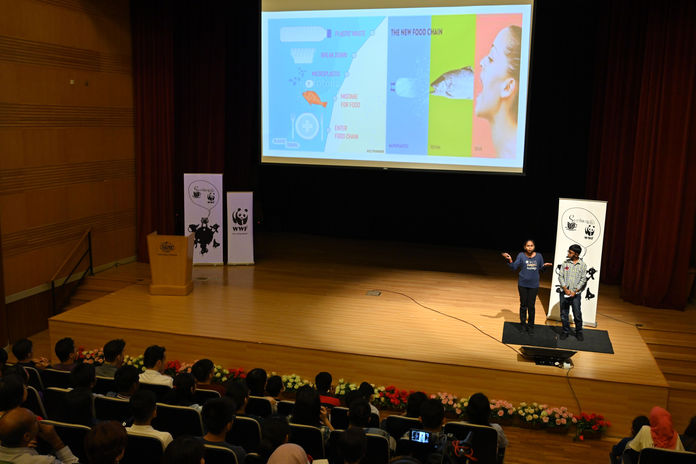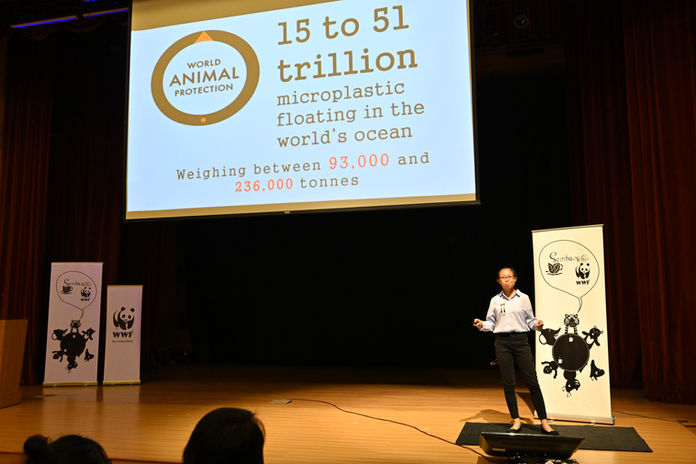Tools & Resources
WWF-Malaysia Celebrates the Eco Champions

Every year WWF-Malaysia celebrates and recognises individuals who go the extra mile for the environment. We admire their undivided passion for sustainability towards the greater good of their schools, campuses, and communities. Their stories are inspirational - some fight against energy waste. Some invested their effort in raising awareness of various environmental causes. Some have done it all and together they have had a massive impact on sustainability and well-being within their communities and beyond.
Award recipients were nominated and voted based on their various contributions to environmental conservation. This year, the winners were brought on the Eco Champion trip to visit Taiping. The city is known for its well-preserved colonial architecture and has recently been recognised as among the top three sustainable cities in the world. WWF-Malaysia was honoured to celebrate the hard work of the students & educators throughout their involvement in the Eco-Schools and FEE EcoCampus programmes.
Engaging Youth to Tackle Plastic
Pollution Crisis

4 Aug 2019, Shah Alam: Harnessing the enthusiasm of today’s youth, WWF-Malaysia organised the third edition of Building Bridges for Sustainable Consumption and Production (BB4SCP) conference in De Palma Hotel, Shah Alam from 1 to 4 Aug. With the conference set to align with the Sustainable Development Goals, the platform aims to empower youth towards a more sustainable lifestyle.
In every BB4SCP conference, WWF-Malaysia brings forward pressing global issues that need immediate attention. Concerned by the statement that Malaysia ranks 8th among nations that mismanage waste, this year more than 80 youth delegates participated in the conference to gain knowledge and find solutions to this crisis.
The versatility of plastic has helped our daily life in numerous ways. Unfortunately, poor waste collection and treatment have given rise to their pervasive presence in nature. Plastic has contaminated the soil, rivers and oceans. Every year, more than 1.1 million seabirds and animals died of ingesting plastic. It has even entered our food chain. Based on a study commissioned by WWF, people could be consuming on average over 100,000 microplastics every year.
WWF’s ultimate goal is to stop plastic leakage into nature by 2030. We advocate producers and businesses to design products and packaging materials with recovery and circularity in mind. By this, the life-cycle of the materials is extended, therefore reducing the use of natural resources to produce plastic materials in the first place. However, we also call for an in-depth study to understand the trade-offs when substituting plastic with alternative materials or redesigning packaging because without an effective waste separation and collection and disposal system, this initiative will not bring about a significant reduction of plastic waste entering the environment.
Addressing this issue requires a collective action along the entire life cycle of plastic - production, consumption and disposal. It requires a joint effort such as policies and stronger enforcement from the government, innovative and sustainable solutions from industry players and behavioural change among consumers.
In this conference, we look towards our youth, our future leaders, to help find solutions to the global crisis of plastic pollution. “WWF-Malaysia always highlights the importance of engaging young people in discussions and plans for combatting environmental issues. There is a growing shift in the way they engage and communicate these days. Social exchanges and expressions are rapidly moving to the digital arena and it has become a tool to influence and negotiate. This digital generation is more informed, more tech-savvy and more connected than any generation before”, Dr Henry Chan, Conservation Director of WWF-Malaysia mentioned during the closing ceremony.
Exposed to various platforms to exchange ideas, the youth delegates took part in workshops, parallel sessions, round-table discussions, and field trips. The conference also invited industry experts, social enterprise vendors, and business owners to help paint a better understanding of plastic pollution crisis.
The conference urged individuals to reduce or stop using single-use plastics, replace disposable plastic water bottles to a reusable one, exchange plastic grocery bags with reusable cloth bags or check plastic packaging if it is recyclable upon purchasing the item. Conference resolutions from the roundtable discussions with industry experts and delegates were documented and will be presented to the Ministry of Energy, Science, Technology, Environment and Climate Change (MESTECC), relevant stakeholders and general assemblies & international meetings.
“MESTECC is pleased to see the conference revolves around the challenges and issues of plastic pollution in our country because we need to rethink the way we consume, manage, recover and source plastic. This initiative complements Malaysia’s Roadmap Towards Zero Single-Use Plastics 2018–2030 which is a national effort to enhance recycling rates, reduce waste disposal to landfills and prevent waste leakages, while promoting circularity of the economy. He also stressed that our collective efforts at individual level to make positive changes to live in harmony with nature is an important catalyst towards a cleaner and greener Malaysia”, explained Dr K. Nagulendran, Deputy Secretary-General for Environment & Climate Change, MESTECC who came to support the youth conference.
“We officially collaborated with WWF-Malaysia for the first time because the theme ‘What’s with Plastics?’ is very relevant to us,” said Dato’ Raymond Sng, MPMA Vice-President of the Malaysian Plastics Manufacturers Association (MPMA).
“In addition, it is important to provide a platform to educate youth about ways to reduce environmental pollutants. They will take the knowledge into the future and demand for change when they are in the position to do so”, he elaborated.
In the effort to bridge the gap between consumers and producers, the BB4SCP conference also featured a sustainable fair sponsored and hosted by Paradigm Mall where more than twenty green vendors provided alternatives for sustainable options, in terms of consumer products, services and ideas. This is to demonstrate that there is always a solution or an alternative to our current lifestyle.
I've got the Power!

In 2019, Eco-Schools celebrates 25 years of excellence in the field of Environmental Education and Education for Sustainable Development.
The Eco-Schools programme is contributing to ensuring that the environment is recognised as a critical element – the most important public good on which Quality of Life is dependent. Since 1994, we have, all together, strived to make our programme a globally well-established vehicle for positive actions, student engagement, and sustainability education through deep experiential learning to prepare generations of active citizens who take the public responsibility to not only conserve the environment but through their handprint reverse the challenges before humanity. The 25th Anniversary Declaration of Eco-Schools pledges to reach every child with Education for Sustainable Development as an important Human Right.
The Eco-Schools 25th Anniversary Video Campaign aims to involve each and every actor within the Eco-Schools global network – students, teachers, school and University administration, school staff, volunteers, other organisations, and our institutional and corporate partners – to voice a message to the global community; that it only takes an idea told out loud to engage ourselves and our political leaders in positive actions! This is also showcases the empowerment that the programme has been able to bring about in youth.
#ecoschools25 #ivegotthepower #ecoleaders
Tackling Plastic Pollution from the
Centre of a Stage

Petaling Jaya: WWF-Malaysia’s storytelling platform, Sembang@WWF saw hundreds of young adults came from all across Malaysia to witness their inspiring friends taking the stage to speak passionately about plastic pollution. Created five years ago, the event is an opportunity for students to speak on various environmental issues held each year in conjunction with the Global Earth Day.
As educators of the next generation of pre-school teachers, Fazida, 54, Ruslan, 58, and Mohd Fuzi, 56, are in charge of the garden and the syllabus taught around it at IPG-KPI. The three have been teaching for decades and have backgrounds in different fields like biology and ecology, agricultural and environmental education, and entrepreneurship – but what they all have in common is a love for gardening.
“Recently Malaysia has been rated as one of the world’s worst countries for plastic pollution. Most of our plastics are dumped, a small portion burnt and a very tiny fraction recycled. This speaking platform is an instrument for us to listen and share ideas on what we can do as individuals to make a change for a better environment,” said Ms Sophia Lim, Executive Director/CEO WWF-Malaysia.
She added, “Young people are among the best communicators on the environmental issues and its impacts. They have a strong presence in social media which is a great tool used to spark environmental activism. It is been used widely and successfully to get people influenced and involved in the environmental movement.”
“I’m honoured to be one of the speakers this year representing the world’s biggest population. We have a long journey ahead of us, it’s important that we play an active role in protecting and improving the environment," said Chong Xin Yi from SMK Damansara Jaya.
Held for the second time at Wisma Kebudayaan Soka Gakkai Malaysia, the event featured a forum discussion titled ‘Joining the Conversation: No Plastic in Nature’. In addition to the speakers sharing their views, a representative from the Ministry of Energy, Science, Technology, Environment and Climate Change, expert from the circular economy and WWF-Malaysia officials sat down to share the challenges and issues surrounding plastic pollution in our country.
Mr Looi Chee Choong from Soka Gakkai Malaysia mentioned that, “The waste and environmental problems caused by humans can certainly be resolved by humans. To resolve issues of ‘global proportions’, we do not have to look very far. We can do something in our local community – schools, local groups, NGOs.” Addressing the youth, he said, “Please be convinced that your efforts have the potential to change the future of our planet and the destiny of humankind.”
WWF-Malaysia also launched the Living Planet Centre – an education initiative to produce an online library of original videos complete with interactive lessons for students and teachers to learn about environment. The online platform celebrates innovative learning that sparks ideas from students around the world to become leaders who will strive a balance between economic, social and environmental sustainability.
- Ends -
Education for Sustainable Development (ESD) Programme,
WWF-Malaysia
~ Empowering Citizens of Tomorrow ~
For more information, please contact:
Farisha Zainol
Sr Communications Officer, Education for Sustainable Development Programme, WWF-Malaysia
Tel: +6019-327 5456
Email: nabidin@wwf.org.my






















































